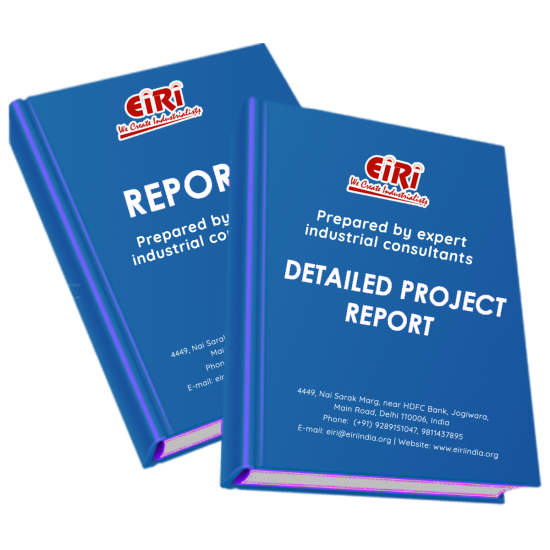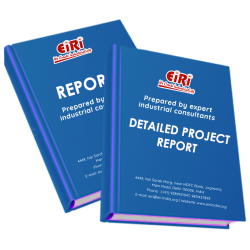Galvanisation Plant

- More than 40 years of experience
- Managed by expert industrial consultants
- ISO 9001-2015 Certified
- Registered under MSME, UAM No: DL01E0012000
- 24/5 Research Support
Get your quesries resolved from an industry expert. Ask your queries before report or book purchase. - Custom Research Service
Speak to the our consultant to design an exclusive study to serve your research needs. - Quality Assurance
All reports are prepared by highly qualified consultants & verified by a panel of experts. - Information Security
Your personal & confidential information is safe & secure.
GALVANISATION PLANT
[EIRI/EDPR/3849] J.C.: 1958XL
INTRODUCTION
Galvanization is the process of applying a protective zinc coating to steel or iron in order to prevent it from rusting. The term is derived from the name of Italian scientist Luigi Galvani. Galvanized iron (GI) sheets are steel sheets which are basically coated with zinc and include a range of hot dip galvanized and electro-galvanized steel sheets. Zinc weathers at a very slow rate, so the coating generally has a long life. Zinc has a greater electro-negativity than iron and hence provides cathodic (or sacrificial) protection to the steel. This results in the zinc corroding in preference to the steel if the coating is chipped or damaged to expose the base metal. Besides acting as galvanic protector, The other functions of the zinc layer are as follow:
• To retain the steel intact with its full initial strength.
• To provide the surface a more pleasing appearance.
• To increase the life of any suitable organic finishing system applied over it.
• To protect the steel from corrosive attack in most atmospheres, acting as a continuous and lasting shield between steel and the atmosphere.
Process of Galvanizing
The process of galvanizing steel sheet was developed simultaneously in France and England in 1837. Both of these methods employed a ‘hot dipping’ process to coat steel sheet with zinc.
Galvanizing is carried out on cold rolled sheets/cold rolled strips. Galvanizing process is broadly divided into hot dipping and electro-galvanizing. The hot dip process is more suitable for heavy coating weights, and electro-galvanizing for lighter coatings. For reasons of efficiency, galvanizing of cold rolled strip is more common than galvanizing of cold rolled sheets.
• Hot dip galvanizing – The principle of the process consists of the immersion of steel strips in molten zinc. The zinc used for galvanizing is high grade with a zinc content of minimum of 99.95 %. After passing through the pretreatment tanks for degreasing, pickling, and cleansing, the strip passes through the annealing furnace and a pot containing molten zinc. The annealing furnace is used to apply the heat cycle needed to obtain the required mechanical properties and activate the surface with a reducing gas, which makes it easy to coat zinc on the strip surface. The coating weight is controlled by a purge gas jet blown on both surfaces of the strip from a nozzle above the pot, to remove excessive molten zinc. This process gives a relatively thick coating of zinc that freezes into a crystalline surface pattern known as spangles. During the process, a multiple layered structure of iron-zinc alloys is formed between the inner surface of the zinc coating and the steel strip.
• Electro-galvanizing – The principle of the process consists of immersion of steel sheet in an electrolyte, a solution of zinc sulfate or cyanide. Electrolytic action deposits a coating of pure zinc on the surface of the iron or steel. The advantages of this process is that the thickness of the coating can be accurately controlled while the limitation of this process is that the thick coatings provided by the hot dip galvanizing process are not usually possible with this method.
A part of the GI steel production is corrugated to produce corrugated sheets (GC). Today the corrugation process is carried out using the process of roll forming. This modern process is highly automated to achieve high productivity and low labour costs. In the corrugation process sheets are pulled off huge rolls and through rolling dies that form the corrugation. After the sheets pass through the rollers it is automatically sheared off at a desired length. The standard shape of corrugated material is the round wavy style, but can be easily modified to a variety of shapes and sizes by simply changing the dies.
The cross section of a galvanized strip is composed of the steel substrate, iron-zinc alloy layers, and a zinc layer. Because the paint adhesion and weldability of the surface of this zinc layer are not necessarily good, galvannealing has been developed to improve these properties. In the basic process for galvannealed strip, the zinc-coated strip emerges from the pot and is heated in a galvannealing furnace, forming an iron-zinc alloy layer by the inter-diffusion of iron and zinc coating layer, so that the surface of the zinc layer also contains some amount of iron. The galvannealing line is usually equipped with a skin pass mill, a tension leveler, and chemical treatment equipment for chromating, following the galvannealing furnace.
GI sheets are produced both in annealed and full hard conditions.
COST ESTIMATION
Plant Capacity 4 MT/Day
Land & Building (2000 sq.mt.) Rs. 1.47 Cr
Plant & Machinery Rs. 2.48 Cr
Working Capital for 1 Month Rs. 17.73 Lac
Total Capital Investment Rs. 4.37 Cr
Rate of Return 22%
Break Even Point 64%
CONTENTS
INTRODUCTION
PROCESS OF GALVANIZING
GI SHEETS SPECIFICATION
ADVANTAGES OF GALVANISING
USES AND APPLICATION OF GALVANISING
B.I.S. SPECIFICATION
PROCESS FLOW CHART
GALVANISING PROCESS
MANUFACTURING PROCESS OVERVIEW
THE GALVANIZING PROCESS CAN BE GROUPED TOGETHER UNDER THREE CATEGORIES, NAMELY
SOME OF THE COMMON TERMINOLOGIES USED IN GALVANIZING PROCESS ARE AS FOLLOWING:
ASH –
DROSS –
FLUX –
OVER-PICKLING –
INHIBITOR –
GALVANIZING BATH-
ALUMINUM ADDITIONS –
COATING THICKNESS
THE METALLURGICAL BOND
HOT DIP GALVANIZING PROCESS
ALL GALVANIZING CONSISTS OF FOUR FUNDAMENTAL STEPS:
1. SURFACE PREPARATION:
A. DEGREASING
B. CLEANING
C. PICKLING
D. AGITATION
E. RINSING
F. FLUXING
2. GALVANIZING:
A. IMMERSION
B. WITHDRAWAL
C. WATER QUENCHING
D. CENTRIFUGING
E. THREAD BRUSHING
3. POST TREATMENT:
4. STACKING:
5. INSPECTION:
CHARACTERISTICS OF GALVANIZED SURFACES
6. QUALITY CONTROL:
INSPECTION & TESTING
MARKET POSITION
CONSTRUCTION INDUSTRY TO LEAD THE GLOBAL GALVANIZED STEEL MARKET
GALVANISED STEEL MARKET
COASTAL INFRASTRUCTURE
AUTO SECTOR
THE RAILWAYS
ENERGY SECTOR
GALVANIZED STRUCTURE STEEL MARKET
GLOBAL GALVANIZED STRUCTURE STEEL MARKET COMPETITION BY TOP MANUFACTURERS
PRINCIPLES OF PLANT LAYOUT
PLANT LOCATION FACTORS
EXPLANATION OF TERMS USED IN THE PROJECT REPORT
PROJECT IMPLEMENTATION SCHEDULES
PLANT LAYOUT
MANUFACTURERS/SUPPLIERS OF GALVANISING SERVICES
SUPPLIERS OF RAW MATERIALS
SUPPLIERS OF ZINC INGOT
SUPPLIERS OF CASTIC SODA
SUPPLIERS OF HYDROCHLORIC ACID
SUPPLIERS OF PLANT AND MACHINERY
SUPPLIERS OF HOT DIP GALVANISING PLANT
SUPPLIERS OF DG SETS
SUPPLIERS OF EOT CRANE
SUPPLIERS OF POWER TRANSFORMERS
SUPPLIERS OF ELECTRICAL PANEL
SUPPLIERS OF ELECTRIC MOTOR
SUPPLIERS OF COOLING TOWER
SUPPLIERS OF EFFULENT TREATMENT PLANT (ETP PLANT)
SUPPLIERS OF AIR POLLUTION CONTROL EQUIPMENTS
SUPPLIERS OF AIR CONDITIONING EQUIPMENTS
SUPPLIERS OF AIR COMPRESSORS
SUPPLIERS OF PLATFORM WEIGHING MACHINE
SUPPLIERS OF MATERIAL HANDLING EQUIPMENTS
SUPPLIERS OF FIRE FIGHTING EQUIPMENTS
SUPPLIERS OF SHOT BLASTING MACHINE
SUPPLIERS OF JIGS AND FIXTURE
SUPPLIERS OF SUBMERSIBLE WATER PUMP
APPENDIX – A:
01. PLANT ECONOMICS
02. LAND & BUILDING
03. PLANT AND MACHINERY
04. OTHER FIXED ASSESTS
05. FIXED CAPITAL
06. RAW MATERIAL
07. SALARY AND WAGES
08. UTILITIES AND OVERHEADS
09. TOTAL WORKING CAPITAL
10. TOTAL CAPITAL INVESTMENT
11. COST OF PRODUCTION
12. TURN OVER/ANNUM
13. BREAK EVEN POINT
14. RESOURCES FOR FINANCE
15. INSTALMENT PAYABLE IN 5 YEARS
16. DEPRECIATION CHART FOR 5 YEARS
17. PROFIT ANALYSIS FOR 5 YEARS
18. PROJECTED BALANCE SHEET FOR (5 YEARS)
How to Make Project Report?
Detailed Project Report (DPR) includes Present Market Position and Expected Future Demand, Technology, Manufacturing Process, Investment Opportunity, Plant Economics and Project Financials. comprehensive analysis from industry covering detailed reporting and evaluates the position of the industry by providing insights to the SWOT analysis of the industry.
Each report include Plant Capacity, requirement of Land & Building, Plant & Machinery, Flow Sheet Diagram, Raw Materials detail with suppliers list, Total Capital Investment along with detailed calculation on Rate of Return, Break-Even Analysis and Profitability Analysis. The report also provides a birds eye view of the global industry with details on projected market size and then progresses to evaluate the industry in detail.
We can prepare detailed project report on any industry as per your requirement.
We can also modify the project capacity and project cost as per your requirement. If you are planning to start a business, contact us today.
Detailed Project Report (DPR) gives you access to decisive data such as:
- Market growth drivers
- Factors limiting market growth
- Current market trends
- Market structure
- Key highlights
Overview of key market forces propelling and restraining market growth:
- Up-to-date analyses of market trends and technological improvements
- Pin-point analyses of market competition dynamics to offer you a competitive edge major competitors
- An array of graphics, BEP analysis of major industry segments
- Detailed analyses of industry trends
- A well-defined technological growth with an impact-analysis
- A clear understanding of the competitive landscape and key product segments
Need Customized Project Report?
- Ask for FREE project related details with our consultant/industry expert.
- Share your specific research requirements for customized project report.
- Request for due diligence and consumer centric studies.
- Still haven't found what you're looking for? Speak to our Custom Research Team
About Engineers India Research Institute:
Note: We can also prepare project report on any subject based on your requirement and country. If you need, we can modify the project capacity and project cost based on your requirement.
Our Clients

Our Approach
- Our research reports comprehensively cover Indian markets (can be modified as per your country), present investigation, standpoint and gauge for a time of five years*.
- The market conjectures are produced on the premise of optional research and are cross-accepted through associations with the business players
- We use dependable wellsprings of data and databases. What's more, data from such sources is handled by us and incorporated into the report
Why buy EIRI reports?
- Our project reports include detailed analysis that help to get industry Present Market Position and Expected Future Demand.
- Offer real analysis driving variables for the business and most recent business sector patterns in the business
- This report comprehends the present status of the business by clarifying a complete SWOT examination and investigation of the interest supply circumstance
- Report gives investigation and top to bottom money related correlation of real players/competitors
- The report gives gauges of key parameters which foresees the business execution





















